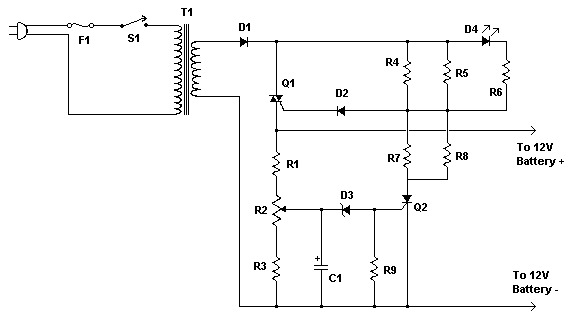| Author |
 Topic Topic  |
|
drilon
Apprentece

Philippines
9 Posts |
 Posted - Mar 11 2007 : 12:00:48 AM Posted - Mar 11 2007 : 12:00:48 AM


|
| Moderator pls help me. How does this circuit work, especially the function of the SCR and TRIAC? please help me. Your Answer will be very much aprreciated. |
Edited by - Aaron Cake on Mar 11 2007 11:53:28 AM |
|
|
Aaron Cake
Administrator
    
Canada
6718 Posts |
 Posted - Mar 11 2007 : 11:53:13 AM Posted - Mar 11 2007 : 11:53:13 AM





|
I've described in detail how this circuit works before. Try a search for "how battery charger works", "battery charger explanation", etc.
Also, moving to Power Supply. |
 |
|
|
drilon
Apprentece

Philippines
9 Posts |
 Posted - Mar 12 2007 : 07:57:00 AM Posted - Mar 12 2007 : 07:57:00 AM


|
I tried to search that but i cant find the answer to my questions... thanks anyway....
this is the schematic of the charger im talking about...
can anyone tell me how R2, Q1(TRIAC) and Q2(SCR) works?
Q2 drives the LED to turn on right? how?
please help me ^_^
 |
 |
|
|
Aaron Cake
Administrator
    
Canada
6718 Posts |
 Posted - Mar 12 2007 : 10:13:29 AM Posted - Mar 12 2007 : 10:13:29 AM





|
OK, I'll do it again since I can't seem to find the explanation either. This will be quick and dirty...
T1 steps down the mains to a little over 12V, D1 rectifies this to a pulsing DC. R1, R2 and R3 form a voltage divider between the + and - of the battery. The output of this divider is set by R2. When the output voltage is not enough to make D3 conduct, Q2 is switched off. Thus, Q1 is switched on via current through R4 and R5. This allows Q1 to conduct into the battery and raise it's voltage. As the battery voltage increases past the point the output of R2 causes D3 to conduct, Q2 is switched on. This pulls current away from D2, pulling pulling current away from the gate of Q1. Q1 thus switches off and charging stops. At the same time, D4 illuminates as the voltage across it increases. C1 helps control oscillation that can occur, R9 makes sure that Q2 is always switched off until D3 starts to conduct. |
 |
|
|
drilon
Apprentece

Philippines
9 Posts |
 Posted - Mar 13 2007 : 08:15:52 AM Posted - Mar 13 2007 : 08:15:52 AM


|
| OK thanks for the explanation, it helped me a lot ^_^ |
 |
|
|
drilon
Apprentece

Philippines
9 Posts |
 Posted - Mar 13 2007 : 08:40:29 AM Posted - Mar 13 2007 : 08:40:29 AM


|
| another question hehhe.... i have jsut constructed this circuit and the output voltage is only arounf 7-9V is it ok? |
 |
|
|
Aaron Cake
Administrator
    
Canada
6718 Posts |
 Posted - Mar 13 2007 : 09:38:47 AM Posted - Mar 13 2007 : 09:38:47 AM





|
| It should measure above 12V with no load. What is the ratings for the T1 that you used? |
 |
|
|
drilon
Apprentece

Philippines
9 Posts |
 Posted - Mar 13 2007 : 9:04:40 PM Posted - Mar 13 2007 : 9:04:40 PM


|
| i only used 3amperes transformer T_T |
 |
|
|
lester
New Member
Philippines
3 Posts |
 Posted - Mar 14 2007 : 03:39:13 AM Posted - Mar 14 2007 : 03:39:13 AM


|
| i also have a question here. is it possible for me to add another led indicating that the battery is currently charging and will turn off when the battery is fully charged? if yes wer can i place it? thank in advance |
lester |
 |
|
|
drilon
Apprentece

Philippines
9 Posts |
 Posted - Mar 14 2007 : 08:19:37 AM Posted - Mar 14 2007 : 08:19:37 AM


|
i only used 12v 3 amperes transformer
|
 |
|
|
Aaron Cake
Administrator
    
Canada
6718 Posts |
 Posted - Mar 14 2007 : 10:42:33 AM Posted - Mar 14 2007 : 10:42:33 AM





|
lester: A LED through a series resistor between teh gate of Q1 and ground will light when the battery is charging. You'll want to find a LED with a very low operating current to avoid switching off Q1.
drilon: What is the AC output voltage of the transformer. If it's at 12V or less, then you may be getting low output voltage due to the drop through D1 and Q1. What happens if you adjust R2 with the circuit connected to a battery? |
 |
|
|
drilon
Apprentece

Philippines
9 Posts |
 Posted - Mar 14 2007 : 8:27:53 PM Posted - Mar 14 2007 : 8:27:53 PM


|
the AC output is around 12.3V.
the LED light up when i adjusted the potentionmeter..... the battery with the voltage of 12.89V.
its like the potentiometer sets the maximum voltage the battery can be charged on...
the battery charge on a rate of around 0.01V per second... |
 |
|
|
lester
New Member
Philippines
3 Posts |
 Posted - Mar 14 2007 : 9:54:20 PM Posted - Mar 14 2007 : 9:54:20 PM


|
| You mean it would be connected in parallel with the gate of Q1 and the ground? not in series with the gate and D2? will it turn off wen the charger stops from charging the battery? thank a lot. i really appreciate it.. |
lester |
 |
|
|
kivdenn
Nobel Prize Winner
    
Uganda
535 Posts |
 Posted - Mar 15 2007 : 08:22:15 AM Posted - Mar 15 2007 : 08:22:15 AM


|
| Hey guys am wondering what will happen if I use a full wave rectifier between the circuitry and the transfomer Thanks in advance |
 |
|
|
Aaron Cake
Administrator
    
Canada
6718 Posts |
 Posted - Mar 15 2007 : 09:08:56 AM Posted - Mar 15 2007 : 09:08:56 AM





|
drilon: So it's working?
lester: Connect one end of your series resistor to the cathode of D2 (the value of the resistor depends on your LED....If you want to guess, it's hard to go wrong with 1K though it may pull too much current away from Q1...up the value if this is an issue). The other end of the resistor goes to the anode of the LED, and the cathode of the LED goes to ground.
kivdenn: The circuit relies on the pulsing DC of a half wave rectifier to allow the SCR and TRIAC to shut off when the voltage falls to zero. With smooth DC, they would remain clamped on. A full wave UNFILTERED rectifier still should work fine. |
 |
|
|
drilon
Apprentece

Philippines
9 Posts |
 Posted - Mar 15 2007 : 8:17:46 PM Posted - Mar 15 2007 : 8:17:46 PM


|
yup it's working, im just wondering why the output is only around 7-9V
thanks again it helped me a lot =) |
 |
|
 Topic Topic  |
|

